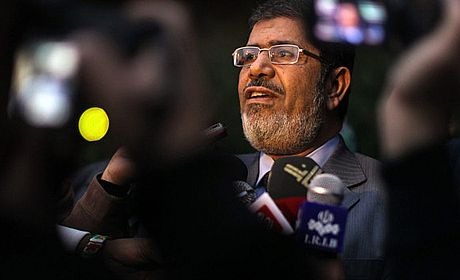Egypt’s Muslim Brotherhood Prefers Its Syrian Sister Party

Syria's Minister of Information has stated that Egypt is Syria’s biggest partner. How has the historic trend of relations between Egypt and Syria been?
Egypt and Syria have historical and geographical relations, for both of them are among big Arab countries and their neighborliness has helped them to play a role in many political and historical issues. Furthermore, Egypt and Syria, whether during the Crusades or during the entrance of neo-colonialism into these two countries, were in the frontline of struggle against both issues. During colonialism, nationalist movements grew and struggles against colonialism and occupation began, which later led to the establishment of republics with the presence of nationalist forces. Then, the two countries cooperated with each other especially in the struggle of both the people of Egypt and Syria against Israel and the occupation of Palestine. The cooperation that existed between the military of Egypt and Syria against the Zionist movement was significant.
What has been the role of the Zionist regime in damaging relations between Egypt and Syria?
During the era of struggle against colonialism, the scientific and political forces of the two countries were constantly in contact with each other, but the establishment of Israel in Palestine was an attempt to cut off relations between two countries and two nations that were friends.
The Zionist regime, in collaboration with the Western countries, tried to separate these two countries. Israel's attacks against Egypt and Syria caused great damages upon the armed forces of these countries and prevented them from pursuing their development programs.
Did the growth of the Islamist movements in Egypt and Syria happen simultaneously?
The issue of the growth of the Islamist movements in Egypt, besides nationalist movements, was intended to spread such tendencies from Egypt to other countries like Syria, Jordan, Lebanon, and Palestine. These movements in Syria began under the same name of the Muslim Brotherhood, but it could not operate as vast as this group in Egypt. The resistance of the people and Syrian and Egyptian officials against Israel is considered as a recognized measure which has impacted other Islamic countries.
What caused the two countries to be separated from each other?
These two countries moved alongside each other in the formation of nationalist, secular, and anti-colonialism parties. Naturally, the damages caused by the Zionist regime against Egypt, especially after the death of Abdul-Nasser and during the Sadat regime, created an atmosphere in which Egypt decided to reconcile with the Zionist regime. But Syria still remained strong in its positions with regard to Israel.
During the Mubarak regime, relations between Egypt and Syria were sometimes strong and occasionally weak. We all remember that Egypt and Syria, during Iraq's attack against Kuwait, formed the 6+2 group comprised of the countries of the Persian Gulf Cooperation Council plus Egypt and Syria. They dispatched their military forces and participated in Kuwait's liberation.
These were the stages when relations between these two countries fluctuated, but Egypt has never been distant from the positions which Syria has taken. Following the fall of the Mubarak regime, a new atmosphere was created which Syria felt that it could use against the Zionist regime. But, this was certainly just the government's tool, for it is true that the Muslim Brotherhood which came to power in Egypt has strong anti-Israeli inclinations, but it also has strong tendencies towards its sister party in Syria, which in turn has impacted Egyptian positions.
Could the closeness of Egypt to Syria, during this country's crisis, help to solve this problem?
If we contemplate the Syrian issue today, we can see that due to the two factors of 1. Egypt's anti-Israeli stances and 2. its close ties with Syria's Muslim Brotherhood, Egypt can help accelerate the process of finding a solution.

